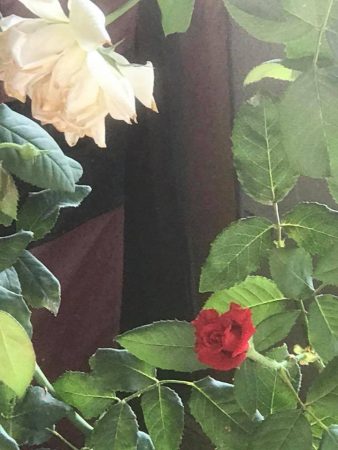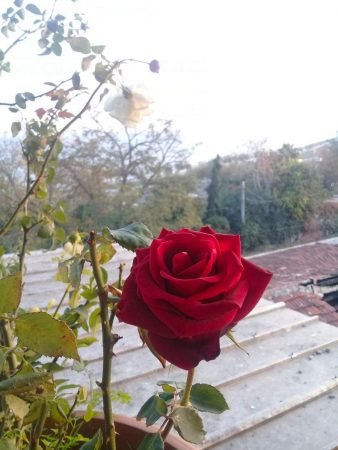
translated to english by ahmet fahreddin uçar
“Die Rose ist ohne warum; sie blühet, weil sie blühet.”
Angelus Silesius.
“Güle dair bir neden yok gül açar çünkü açar/
Ne gözetir kendini ne görülmek arzular..”
Merhum Sedat Umran çevirmiş…
.
GÜLÜN SIRRI
.
Ey gönül gel, gör, ibret al!
Bir avuç kilden topraktan gül biter…
Topraktan gül nasıl biter?
Tohum nasıl oluyor gül?
.
Tohm-u gül, güldür, gül açar,
Bu cansız ‘kil özü’nden ne alır gül?*
bir gül açmışsa eğer gâyesī var, cânı var
Gül mü asıl, Kil mi asıldır, ey dil?
.
Aslı, nesli, resm-i hüsn-ū ânı var
Kōkusū gül, rengi gül, bir gonce-ī pinhânı var
Ey ‘Sebeb’-ī hilkat-ī gül, ‘Gâyet’-ī vuslat nedir?
Şerh-i esrâr-ī rümûzdur hem nihânî bir sadâ!
.
Gül açar; ki sırr-ı beyânıdır:
Bir avuç “kil”ī…gül eden O’dur!
.
Ey gönül gel kendözün bil
Gel kendine sefer et, bul!
Kendözünden kendine gel
Budur Yolculuk, budur Yol!
.
Dil de bir güldür: “Lem-yezel”
.
Her nesnede gizlidir ol
Evvel, Âhir, Bâtın, Zâhir
Ondan sever şeydâ gönül
Ondan biter mutalsam gül
.
Ondan mıdır ki güldür, gül?
gül değildir gönüldür gül
.
Ondan mıdır şeydâ gönül?
gül alır gül satar gönül
.
güldür solar tekrar biter
dalında bir bülbül öter
kokusu cânımda tüter
gönlümdeki bir güldür, gül
.
“Her gül-ī gülzâr bûyî
nâfe-ī “kaalû: belâ!” **
Her dem-ī hoş-bû gül-ī ter
taa ezelden merhabâ!
.
Sebebi nedir bu açan gülün?
niye yaprağı dökülür dalın?
nereden gelir kokusu gülün?
.
Gül kokar “açık sır” olur âşikâr ***
“Gül remz-i cemâl-ī gül-i ruhsârı o yârin!”•••
Dil şâhid-i mazmûn olalī ol gül-i gülzâr
Gül olur açar…
Gül açar ki sırr ola âşikâr!…
Bârekallah, ger nühüfte, ger selâm-i âşikâr…
Taa ezelden merhabâ!
Taa ezelden merhabâ!
.
…*“Üstünde Gül biten bir toprağın ‘kil’ tabakasına
o gülün kokusu sinmiş, ve o kilde dahi bir gül kokusu
peydâ olmuş”… Kil dermiş ki: “ben bir müddet gül ile
komşu oldum/ bu gül kokusunu o gülden aldım”
Gülistan, Şeyh Sa’dî-i Şîrâzî
•* şairin kendi divanındaki “Fuzuli’nin gazeline taştîr” şiirinden alınmış bir mısra
•• *açık sır (open secret) Goethe’den muktebes “varlığın ma’na ve mazmunu” kitabında geçen bir bahis
••• şairin kendi “tevhid kasidesi” nden alınma bir mısradır
SECRET OF THE ROSE
“There is no reason for the rose, the rose blossoms, because it does.
Neither craves to be seen, nor cares for itself.”
Angelus Silesius. Translated by Sedat Umran
.
.
.
Oh heart, come and see! Take a lesson!
From a piece of clay and soil a rose is risen.
How does a rose rise from the soil?
.How does a seed become a rose?
.
The seed of the rose, is the rose, it burgeons.
What does the rose get from this lifeless clay?
If a rose blooms, there is a purpose, since it is alive!
Oh heart, is it the Rose or the Clay that is of the essence?
.
It has an origin, a genesis, and noblesse and a moment of beauty.
It smells of the rose, its color is the rose, and a hidden sprout it has.
What is the purpose of its creation?what is the aim of this ultimate union?
That is an exegesis of the meaning from mysteries of those hidden signs, and also a secret call!
.
The blooming of the rose is the revelation of a secret:
It is Him who makes a rose from a piece of clay.
.
Oh heart, come and know thyself,
come and journey into thyself, and find!
Come from yourself toward yourself.
That is the journey, that is the Way!
.
The heart is also a rose – everlasting one!
.
He is in every object, former and latter,
innermost and outermost.
Therefrom comes the talisman of the rose.
Is that why the rose is the rose?
The. rose is the heart, it is not a rose.
.
Is that why the heart flows over?
The heart gets a rose and gives a rose.
The rose withers, and buds again,
And on its branch the nightingale chirps,
While its smell reeks into my soul.
The rose is a rose in my heart.
.
Every rose in the garden is the musk of saying yes,
to the oldest question of Old Testament
Every whiff of it is a blessing,
it is a greeting from eternity.
.
What for opens the rose?
Why does its petals fall?
From where comes its scent?
.
The rose smells, and the “open secret” reveals.
.
“The rose is a symbol of the beauty of that rosy cheek of the Beloved!
Since I have become the witness of the concealed meaning of God, that rose of
the garden of roses.
Becomes a rose and blooms again and again
.
The rose blooms so to reveal the secret…
“The clay layer of the soil on which the rose blossomed
absorbed the smell of the rose, and even in that clay
arose the smell of the rose. The Clay would say:
“I have been the neighbour of the rose for a while,
and that’s where I got this smell of rose”
Gülistan, Şeyh Sa’dî-i Şîrâzî
A day ago, after reading the rose poem to professor dr numan Konuk, a dove guest came to our house. When Numan told me, we realized that there was a “hello” text on the box where the dove nested, and we realized that this is a “salute without voice”
gül şiirinin sonundaki merhaba kelimesine bir kumru ile irsâl olunan “merhabâ!” cevabının hikayesidir:
bir gün önce professor dr Numan Konuk’a gül şiirini okuduktan sonra bizim eve bir kumru misafir geldi. kumrunun yuva yaptığı kutunun üzerinde de “merhaba” yazısı var olduğunu numan hoca söyleyince farkettik ki bu da bir “selâm-ı mâ lâ kelâm”…
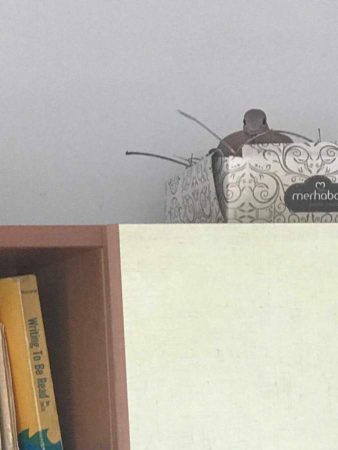
mâverâdan geldi işte bir selâm, “maa lâ kelâm”/
merhabâ ey kumru cânım, cân-ı cânım merhabâ/
bârekallah ger nühüfte ger selâm-i âşikâr…
sübhanallah, v’elhamdü lillah, fe-enzur ilâ âsâri rahmet illâh: kumru gelip bizim kitaplığın üstündeki üzerinde “merhaba” yazan kutucuğa yuva yapmış!…
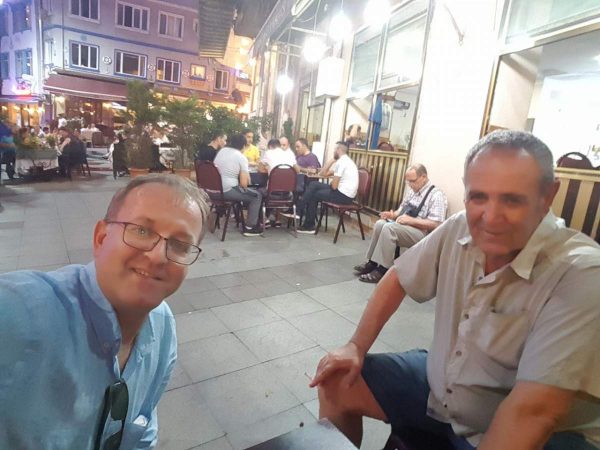
28 Haziran: Numan Hoca’ya, Gül şiirindeki
“Her gül-î gülzâr bûyî
nâfe-î “kaalû: belâ!”
Her dem-î hoş-bû gül-î ter
taa ezelden merhabâ!”
kısmının ne demek olduğunu açıklarken…
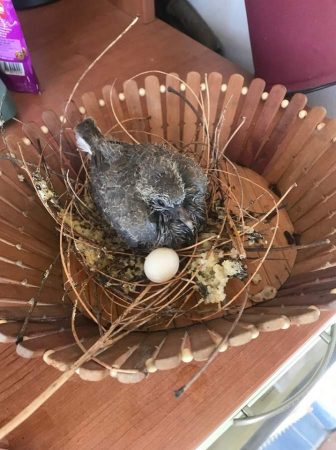
here is another translation to arabic by fatma uçar:
يا فؤاد تعى، شوف، إعتبر !
ينبت الوردة من حفنة طين و تراب…
كيف ينبت الورد من التراب؟
كيف يكون )يتحول( البذر للورد؟
بذر الورد، يعني هي الورد، تتفتح ورد
ماذا يأخذ الورد من هذا الطين الجامد )ميت
( إذا تفتح وردا معناته فيه غاية، فيه روح
يا لسان، عجب الورد الأصل و لا طين الأصل؟
.
إلها أصلها، ذريتها )سلالةها
، ريحتها ورد، لونها ورد
يا سبب خلوق الورد، ما غاية الوصول؟
يتفتح الورد ؛ إذا تفته إظهار السر :
ها هو! الذي يجعله حفنة “الطين”… وردة”
.
يا فؤاد تعى إعرف نفسك
تعى سافر لذات نفسك، إكتشف !
تعى من ذات نفسك إلى نفسك
ها هو السفر، ها هو الطريق
.
“لسان أيضا وردة : “لم يزل”
.
هو متخبي في كل الأشياء
أول، آخر، باطن، ظاهر
منه يحب الفؤاد العاشق
منه ينبت الورد المطلسم
.
عجب بهذا السبب الوردة وردة
ليس الورد ورد، الفؤاد ورد
.
لهذا السبب الفؤاد عاشق الفؤاد يشتري ورد، يبيع ورد
الورد يذبل و ينبط من جديد )مجددا(
وردة
يزقزق بلبلا في غصنه ريحته حسرة )تشوق( في روحي الذي في فؤادي وردة وردة
ما سببها لهذه الوردة التي إنفتحت؟ لماذا يسقط أوراق الغصن؟ من أين يأتي ريحة الوردة؟
الوردة تنفح و “السر المكشوف” صير آشيكار *** “الوردة رمز الجمال لوردة الخد!” *** اللسان شاهد المعنى لأجل وردة الخد يكون وردة و يتفتح يتفتح الورد حتى ليكون السر آشيكار )مكشوف(
بارك ا إذ مخبى أو إذ يكون سلام آشيكار
مرحبا من الأزل
مرحبا من الأزل
…* “تراب نبتت فوقه وردة عبق في طبقة الطين فيه رائحة الورد، حتى في طبقة الطين منه ظهر رائحة الورد” الطين كان يقول : ” أنا صرت جارة لورد مدة / أخذت هذه الرائحة الورد منها” غولستان، شيخ صادي شيرازي
.* مأخوذ من بيت الشعر في ديوان الشاعر لشعر “الجواب لغزل فوزولي” ..* في كتاب ” معنى و مظمون الوجود” مآخوذ من غوته عن السر المكشوف )open secret( … مآخوذ من بيتالشعر لشاعر “اسمه قصيدة التوحيد”
Мой сын перевел это на английский и google translate перевел на русский:
РОЗА
«Нет никакой причины для розы, розы цветут, потому что это так.
Ни жаждет быть увиденным, ни заботится о себе ».
Ангелус Силезий. Перевод Седата Умрана
.
,
,
О, сердце, иди и смотри! Возьми урок!
Из куска глины и почвы поднялась роза.
Как роза поднимается из почвы?
Как семя становится розой?
,
Семя розы – это роза, она расцветает.
Что роза получает от этой безжизненной глины?
Если роза цветет, цель есть, ведь она живая!
О сердце, это роза или глина, которая имеет существенное значение?
,
У него есть происхождение, происхождение, благородство и момент красоты.
Она пахнет розой, ее цвет – роза, и у нее есть скрытый росток.
Какова цель его создания? где окончательный союз?
Это толкование значения тайн этих скрытых знаков, а также тайный зов!
,
Цветение розы – это раскрытие тайны:
именно Он делает розу из куска глины.
,
О сердце, иди и познай себя,
иди и путешествуй в себя и найди!
Приди от себя к себе.
Это путешествие, это Путь!
,
Сердце также роза – вечная!
,
Он есть в каждом объекте, первом и последнем,
внутреннем и внешнем.
Оттуда приходит талисман розы.
Вот почему роза это роза?
. роза это сердце, это не роза.
,
Вот почему сердце течет?
Сердце получает розу и дает розу.
Роза увядает и снова распускается,
И на ее ветке щебетает соловей,
Пока его запах пахнет в моей душе.
Роза – это роза в моем сердце.
,
Каждая роза в саду – это мускус, чтобы сказать «да»
на самый древний вопрос Ветхого Завета.
Каждый его запах – это благословение,
это приветствие вечности.
,
Зачем открывается роза?
Почему его лепестки падают?
Откуда его аромат?
,
Роза пахнет, и раскрывается «открытый секрет».
,
«Роза – символ красоты этой розовой щеки Возлюбленного!
С тех пор как я стал свидетелем скрытого значения Бога, эта роза
сада роз.
Становится розой и цветет снова и снова
Роза расцветает так, чтобы раскрыть секрет ..
Да благословит Бог, будь то секрет или открытый Привет
это вечный Привет
Привет всегда!
the scent of a rose resides in quantum fields…

